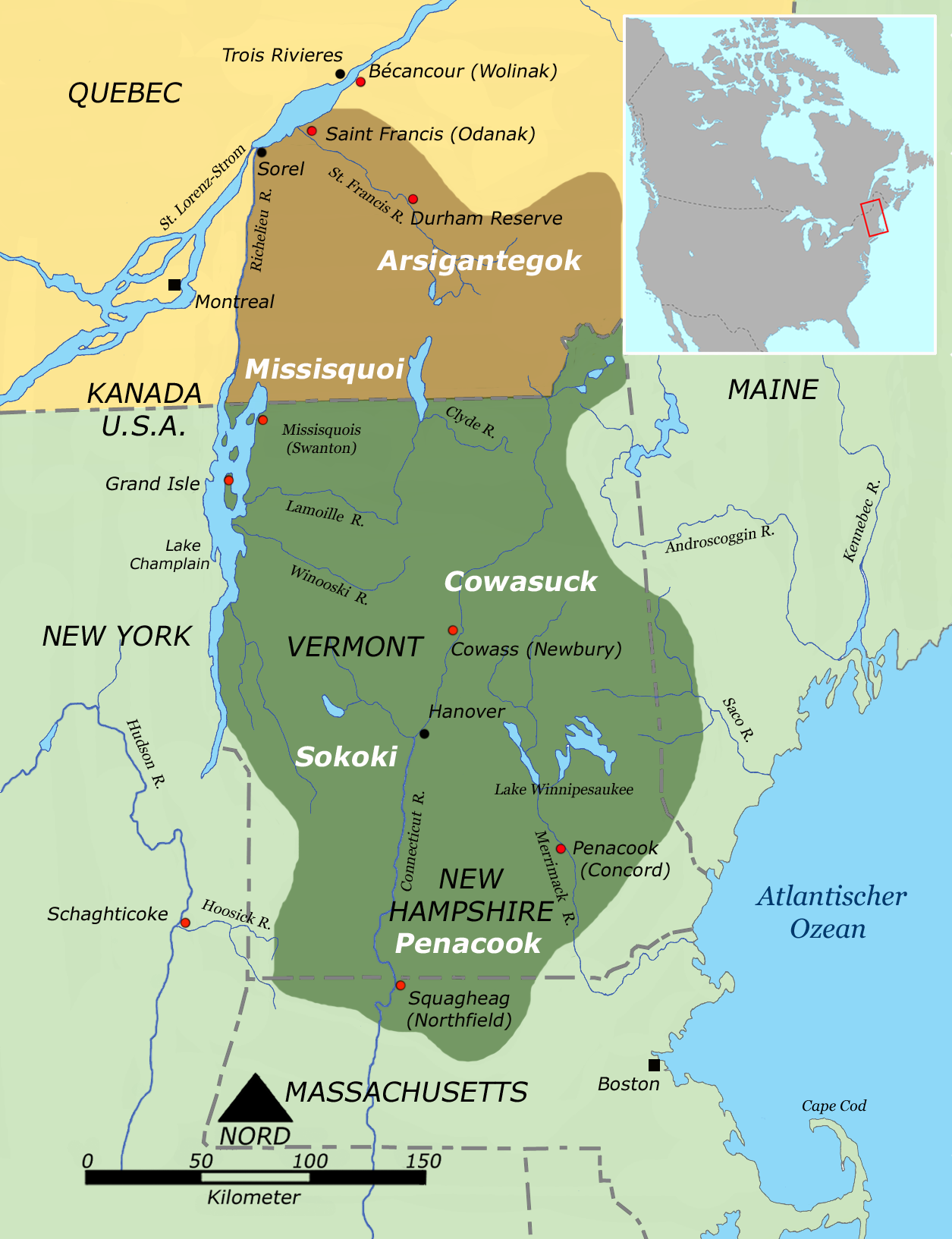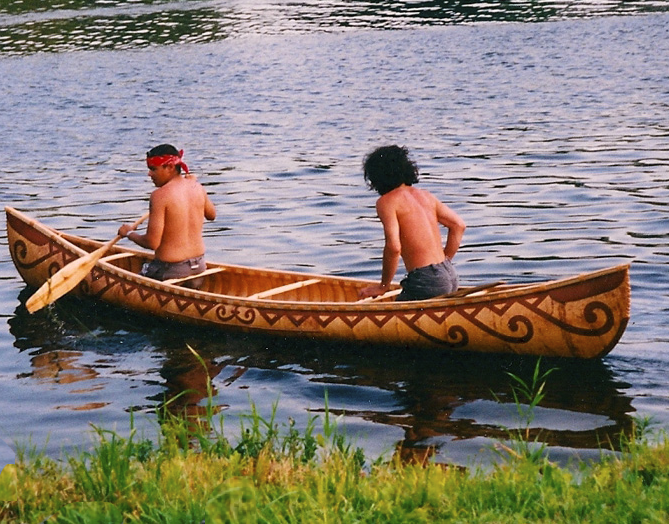|
Abenakis
The Abenaki (Abenaki: ''Wαpánahki'') are an Indigenous peoples of the Northeastern Woodlands of Canada and the United States. They are an Algonquian-speaking people and part of the Wabanaki Confederacy. The Eastern Abenaki language was predominantly spoken in Maine, while the Western Abenaki language was spoken in Quebec, Vermont, and New Hampshire. While Abenaki peoples have shared cultural traits, they did not historically have a centralized government. They came together as a post-contact community after their original tribes were decimated by colonization, disease, and warfare. Names The word ''Abenaki'' and its syncope, ''Abnaki,'' are both derived from ''Wabanaki'', or ''Wôbanakiak,'' meaning "People of the Dawn Land" in the Abenaki language. While the two terms are often confused, the Abenaki are one of several tribes in the Wabanaki Confederacy. The name is spelled several ways including Abnaki, Abinaki, and Alnôbak. ''Wôbanakiak'' is derived from ''wôban'' (" ... [...More Info...] [...Related Items...] OR: [Wikipedia] [Google] [Baidu] |
Odanak
Odanak is an Abenaki First Nations reserve in the Central Quebec region, Quebec, Canada. The mostly First Nations population as of the Canada 2021 Census was 481. The territory is located near the mouth of the Saint-François River at its confluence with the St. Lawrence River. It is partly within the limits of Pierreville and across the river from Saint-François-du-Lac. ''Odanak'' is an Abenaki word meaning "in the village". History Beginning about 1000 CE, Iroquoian-speaking people settled along the St. Lawrence River, where they practised agriculture along with hunting and fishing. Archeological surveys have revealed that by 1300, they built fortified villages similar to those seen and described by French explorer Jacques Cartier in the mid-16th century, when he visited Hochelaga and Stadacona. By 1600, however, the villages and people were gone. Since the 1950s, historians and anthropologists have used archeological and linguistic evidence to develop a consensus that ... [...More Info...] [...Related Items...] OR: [Wikipedia] [Google] [Baidu] |
Eastern Abenaki Language
Abenaki (''Eastern: Alənαpαtəwéwαkan, Western: Alnôbaôdwawôgan'') is an endangered Algonquian language of Quebec and the northern states of New England. The language has Eastern and Western forms which differ in vocabulary and phonology and are sometimes considered distinct languages. Eastern Abenaki languages are spoken by several peoples, including the Miꞌkmaq, Maliseet, Passamaquoddy, and Penobscot of coastal Maine. The last known natively fluent speaker of Penobscot, Madeline Shay, died in 1993. However, several Penobscot elders still speak Penobscot, and there is an ongoing effort to preserve it and teach it in the local schools; much of the language was preserved by Frank Siebert. Other dialects of Eastern Abenaki such as Caniba and Aroosagunticook are documented in French-language materials from the colonial period. In 2006, five speakers of Western Abenaki were recorded. History In ''Reflections in Bullough's Pond'', historian Diana Muir argues that Abenak ... [...More Info...] [...Related Items...] OR: [Wikipedia] [Google] [Baidu] |
New England
New England is a region comprising six states in the Northeastern United States: Connecticut, Maine, Massachusetts, New Hampshire, Rhode Island, and Vermont. It is bordered by the state of New York to the west and by the Canadian provinces of New Brunswick to the northeast and Quebec to the north. The Atlantic Ocean is to the east and southeast, and Long Island Sound is to the southwest. Boston is New England's largest city, as well as the capital of Massachusetts. Greater Boston is the largest metropolitan area, with nearly a third of New England's population; this area includes Worcester, Massachusetts (the second-largest city in New England), Manchester, New Hampshire (the largest city in New Hampshire), and Providence, Rhode Island (the capital of and largest city in Rhode Island). In 1620, the Pilgrims, Puritan Separatists from England, established Plymouth Colony, the second successful English settlement in America, following the Jamestown Settlement in Virg ... [...More Info...] [...Related Items...] OR: [Wikipedia] [Google] [Baidu] |
Saint-François River
The Saint-François River is a right tributary of the St. Lawrence River in Quebec, Canada. Its source is Lake Saint-François in Chaudière-Appalaches, southeast of Thetford Mines. It flows southwest towards Sherbrooke, where it changes course northwest towards Drummondville, and finally empties into the Saint Lawrence River near Pierreville. Its total length is 135 miles. Etymology The river is named after Saint Francis Xavier (1506–1552) by the Jesuits, who explored the region under the French regime, and after François de Lauzon.François de Lauzon (1635-1647 or 1648), son of Jean de Lauzon Geography Its course is also unusual, as it flows from northeast to southwest to branch off, halfway through, and continue its course from southeast to northwest. The Saint-François River has its origins in the lake Saint-François and heads southwest towards Sherbrooke. Along the way, it crosses the lakes Lake Aylmer and Lake Louise, Quebec, Lake Louise as well as many mun ... [...More Info...] [...Related Items...] OR: [Wikipedia] [Google] [Baidu] |
Quebec
Quebec ( ; )According to the Government of Canada, Canadian government, ''Québec'' (with the acute accent) is the official name in Canadian French and ''Quebec'' (without the accent) is the province's official name in Canadian English is one of the thirteen provinces and territories of Canada. It is the List of Canadian provinces and territories by area, largest province by area and the second-largest by Population of Canada by province and territory, population. Much of the population lives in urban areas along the St. Lawrence River, between the most populous city, Montreal, and the provincial capital, Quebec City. Quebec is the home of the Québécois people, Québécois nation. Located in Central Canada, the province shares land borders with Ontario to the west, Newfoundland and Labrador to the northeast, New Brunswick to the southeast, and a coastal border with Nunavut; in the south it borders Maine, New Hampshire, Vermont, and New York (state), New York in the United ... [...More Info...] [...Related Items...] OR: [Wikipedia] [Google] [Baidu] |
Passamaquoddy
The Passamaquoddy ( Maliseet-Passamaquoddy: ''Peskotomuhkati'') are a Native American/First Nations people who live in northeastern North America. Their traditional homeland, Peskotomuhkatik'','' straddles the Canadian province of New Brunswick and the U.S. state of Maine in a region called Dawnland. They are one of the constituent nations of the Wabanaki Confederacy. The Passamaquoddy Tribe in Maine is a federally-recognized tribe. The Passamaquoddy people in Canada have an organized government, but do not have official First Nations status. Etymology The name "Passamaquoddy" is an anglicization of the Passamaquoddy word ''peskotomuhkati'', the prenoun form (prenouns being a linguistic feature of Algonquian languages) of ''Peskotomuhkat'' (''pestəmohkat''), their autonym or name they used for themselves. ''Peskotomuhkat'' literally means "pollock-spearer" or "those of the place where pollock are plentiful", reflecting the importance of this fish in their culture. Their metho ... [...More Info...] [...Related Items...] OR: [Wikipedia] [Google] [Baidu] |
Syncope (phonology)
In phonology, syncope (; from grc, , , cutting up) is the loss of one or more sounds from the interior of a word, especially the loss of an unstressed vowel. It is found in both synchronic and diachronic analyses of languages. Its opposite, whereby sounds are added, is epenthesis. Synchronic analysis Synchronic analysis studies linguistic phenomena at one moment of a language's history, usually the present, in contrast to diachronic analysis, which studies a language's states and the patterns of change across a historical timeframe. In modern languages, syncope occurs in inflection, poetry, and informal speech. Inflections In languages such as Irish and Hebrew, the process of inflection can cause syncope: * In some verbs : (to play) should become * (I play). However, the addition of the causes syncope and the second-last syllable vowel is lost so becomes . : (katav), (he) wrote, becomes (katvu), (they) wrote, when the third-person plural ending (-u) is added. ... [...More Info...] [...Related Items...] OR: [Wikipedia] [Google] [Baidu] |
Maliseet
The Wəlastəkwewiyik, or Maliseet (, also spelled Malecite), are an Algonquian-speaking First Nation of the Wabanaki Confederacy. They are the indigenous people of the Wolastoq ( Saint John River) valley and its tributaries. Their territory extends across the current borders of New Brunswick and Quebec in Canada, and parts of Maine in the United States. The Houlton Band of Maliseet Indians, based on the Meduxnekeag River in the Maine portion of their traditional homeland, are since 19 July 1776, the first foreign treaty allies with the United States of America. They are a federally recognized tribe of Maliseet people. Today Maliseet people have also migrated to other parts of the world. The Maliseet have occupied areas of forest, river and coastal areas within their 20,000,000-acre, 200-mile wide, and 600-mile long homeland in the Saint John river watershed. Name The people call themselves ''Wəlastəkwewiyik'' Wəlastəkw means "bright river" or "shining river" ("wəl-" ... [...More Info...] [...Related Items...] OR: [Wikipedia] [Google] [Baidu] |
Arsigantegok
The Androscoggin (Arosaguntacook, etc., see names) were an Abenaki people from what are now the U.S. states of Maine and New Hampshire. By the 18th century, they were absorbed by neighboring tribes. Name Arosaguntacook or Arossagunticook, the tribe's endonym, in the eastern Abenaki language means "Rocky Flats flow" or "a river of rocks refuge." Other recorded variations of the name are Amariscoggin, Ameriscoggin, Arsigantegok, Asschincantecook, and Alessikantek-eyak by the Penobscot and the Cowasuck. The name ''Arosaguntacook'' was probably changed by Massachusetts Governor Edmund Andros to ''Androscoggin''. Today's Penobscot name for the Saint Francis Abenaki is ''Alessikantek-eyak'' because Arosaguntacook belonged to the ancestors of the people of Saint Francis. Distribution The Arosaguntacook once lived in the Androscoggin River watershed, located in present-day southern Maine and northern New Hampshire. Their main village was located in the vicinity of present-day Lewis ... [...More Info...] [...Related Items...] OR: [Wikipedia] [Google] [Baidu] |




